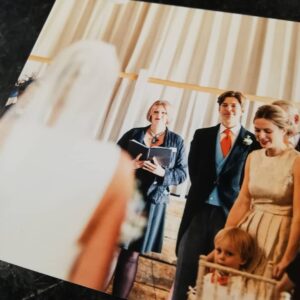Why Rigour in Celebrant Training is Essential
In my role as a celebrant, there are times when I’ve had to step in at next-to-no notice for another celebrant. In my funeral work, it’s usually because the celebrant has been ‘sacked’ by the client. It’s an awful situation all around, but I find myself (even with only 24 hours of notice) interviewing a family and writing a completely new script from scratch. The bereaved deserve nothing but our best care (however, this applies to all our clients).

Veronika officiating a bereavement ceremony at Ashgate Lane Cemetery Chapel
You might also have to step in for a celebrant due to a sudden illness or bereavement. It might be that you’re working with their script rather than your own. Now, the truth is we all have different writing (and presentation) styles. However, what we should all have in common (as professional celebrants) is an immaculate script that any client and/or celebrant could pick up and read through easily, clearly understanding every bit of narrative and choreography.

When I’m wearing my Celebrant Trainer hat, I spend a lot of time rigorously going through our students’ work. In some cases, the feedback takes longer than it took for the student to write the script. At the other end of the continuum, I have an easy, straight forward and enjoyable reading experience with little need for any notes apart from high praise. Some students express how much they appreciate the detailed rigour, and just how much they learn from that process. Some don’t enjoy the process at all (no one likes to be critiqued!), and for the minority it could be enough to make them question celebrancy. Despite how that might seem, this is a good thing! When we work with clients, we take direction from them. If we can’t take direction, we’ll wither quickly.

In thirty years of celebrancy, I’ve only once ever asked another celebrant to fill in for me. It was the day I thought my mum was dying (she died two days later). After two months of anticipatory grief, and crying every night, there was little left inside me. On the day in question, I had zero sleep the night before. Late that evening, I had messaged another celebrant asking if, should my mum die during the night, could she officiate the funeral I had booked in the morning? She got up early to check if I’d messaged, and at 7am I responded with ‘please do this ceremony’. I was gutted. Every bereaved family I work with is important to me, and I really didn’t want to let the family down. I also cared for them enough to know that in my exhausted state I wouldn’t do the ceremony their wife/mum deserved. Kirstie did a lovely job (with only a few hours to practise the script). One thing she commented on to me (and the funeral director) was how easy my script was to follow. When I set out a script, it isn’t just about the words I write, but the way it is laid out on the page, the font type and size, and clear bold headings for each change in the ceremony’s order of service. I also read and re-read out loud (off paper) to check for any typos I might have missed. I do this for myself, for my client, and in the awful event someone has to step in. (As added insurance, I always email myself the script before heading off to a ceremony. If, for some reason, I can’t get to the venue, I can email the script and someone else could read it. Not ideal. And certainly not what I’d like, especially as I rehearse my ceremonies about twenty times!)

Veronika officiating a beautiful Dutch wedding at Askham Hall, Cumbria
So, rigour. What do I look for when assessing scripts?
• Spelling
• Grammar
• Factual accuracy
• Style, feel, clarity
• Sense
• Flair and flow
• Authenticity (I quickly sense if someone has poached from Google or used AI)
• Repetition
• Verbosity
• Layout
• Consistency
• Ease of differentiating between narrative and choreography
An experienced celebrant should be a master of self-editing their work. Some manage it, but based on what I’ve seen over the years when mentoring professional celebrants who’ve trained elsewhere, it’s clear there was never any rigour in their training. It always shows.

Veronika Robinson and Paul Robinson are a husband and wife team whose boutique celebrant training attracts people from around the world. Heart-led Celebrants has earned a reputation for excellence in celebrant training, and those who are certified exemplify the highest standards in the industry. They teach on a one-to-one basis. Veronika also runs celebrant retreats in rural Cumbria.
Veronika is the author of many books including the popular Celebrant Collection: Write That Eulogy; The Successful Celebrant; Funeral Celebrant Ceremony Planner; Wedding Celebrant Ceremony Planner; The Discrimination-free Celebrant; The Five Elements. She also edited and published issues 1 to 13 of The Celebrant magazine.
Award-winning voice artist, Paul Robinson, has had a whole career centred around his voice and other people’s. He’s highly experienced as a celebrant, trained actor, drama coach, voice-over artist, singer, broadcaster, compère, and ventriloquist. Paul is an excellent communicator and teacher, and has a sixth sense about how to relate to individuals, groups and audiences.




